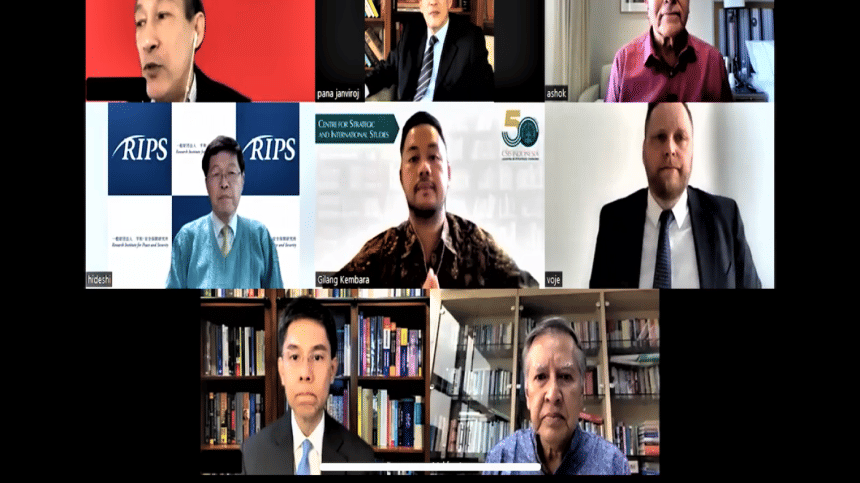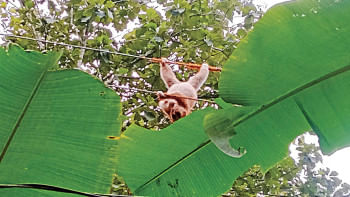War in Ukraine: Asia must strengthen rule-based int’l order

Amid escalating super-power rivalries, Asian nations have to unite with like-minded countries to strengthen rule-based international order to prevent the repeat of invasions like Ukraine, said regional security and defence experts at an Asia News Network webinar.
The webinar titled "Europe's Geopolitical Seismic Shift: What does it mean for Asia?" was organised on Thursday (March 31, 2022) jointly by The Statesman of India, Jakarta Post, Korea Herald – all of which are members of Asia News Network, an alliance of 20 national media from 19 Asian countries.
The war in Ukraine and the way it has unfolded will have major impacts on the region, they said, adding that the events are forcing Asian countries to rethink their respective security policies.
Mahfuz Anam, editor of The Daily Star and current ANN chairman, in his opening remark said the war in Ukraine has shaken Asia like the rest of the world.
Defying the West's calls, China has refused to condemn the "invasion", signalling a new polarisation in world politics. India, a key ally of the West, has also refrained from condemning the Russian action, he said.
"This is very much felt by us. It reminded many small countries of the nightmare of Great Power rivalries. It reminded us that great powerful forces can forcefully invade small nations, changing borders in a matter of days," said Dr Panitan Wattanayagorn, chairman of the Thai Prime Minister's Security Advisory Committee.
Panitan said the war is a big setback for regional balances, which many countries in Asia, Asean included, have been trying to achieve for a long time.
He feared the crisis will complicate regional politics of certain countries and affect the stability and security of South East Asia. Thailand is drafting a new national security strategy which, he hinted, might have to prepare the country for power competition.
Hideshi Tokuchi, president of Japan's Research Institute for Peace and Security, said his country is now reviewing its national security law. Japan will have to invest much more in its national defence, focusing not just on China but also on Russia and North Korea.
He described the Russian "aggression" as a serious challenge to the rule-based international order which has been the cornerstone of security and prosperity for Asia and the rest of the world.
Ashok Sajjanhar, a research fellow at ManoharParrikar Institute for Defence Studies and Analyses, said a major shakeup of the global security apparatus due to the diminishing power of Russia.
He said Russia's credibility has taken a huge hammering alongside its leader, President Vladimir Putin.
Gilang Kembara from Indonesia's Centre for Strategic and International Studies said some countries like Myanmar might see the crisis as an opportunity. He feared the isolated coup-hit country may leave Asean and could join the Shanghai Cooperation or veer more towards Russia.
Dr Julian Voje, head of Policy at Munich Security Conference, speaking in a personal capacity as all others in his keynote remarks, dismissed any notion of a geopolitical seismic shift.
"It's not about the West against Russia," he said, "rather it's a moment when all countries have to see if they want to support the international rule-based order."
"It's not about neutrality or which team we want to join. But actually about which kind of world you want to live in, especially for smaller countries," he said.
"Do you want to live in a world which is safe and secure so that another country will not invade you?" asked Voje, adding that the new world order should be the one that will promote healthy competition and cooperation.
Hideshi outlined a few lessons from the War in Ukraine. He observed that eroding democratic values has undermined the viability of rule-based international order.
He said US leadership, weakened by division in American society, now needs support from its allies to keep engaging in world affairs.
"No country can defend sovereignty all by itself," he said emphasizing alliance.
However, he said, sanctions might not help to end the war and these punitive measures will be less effective against China.
Panitan suggested that the Ukraine invasion may help Asean to become more united. Its pragmatic approach may come under good use allowing its members to reach out and reconnect with all allies and conduct different treaties or forge strategic partnerships.
He suggested that many of the regional security and economic groups – Quad, AKUS, Apec - may have to go back to the drawing board. "There is a real need to redesign new regional politics based on a new framework of regional architecture."
"It's too bad and so sad that Ukraine, key in regional balance in Europe, didn't play its card well. Too bad we have lost so many lives and SE Asian countries hopefully will take many lessons from this and adjust their policies accordingly," added Panitan.

 For all latest news, follow The Daily Star's Google News channel.
For all latest news, follow The Daily Star's Google News channel. 



Comments